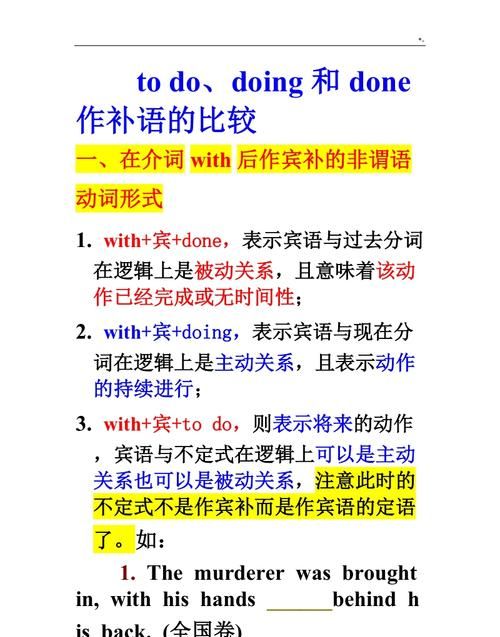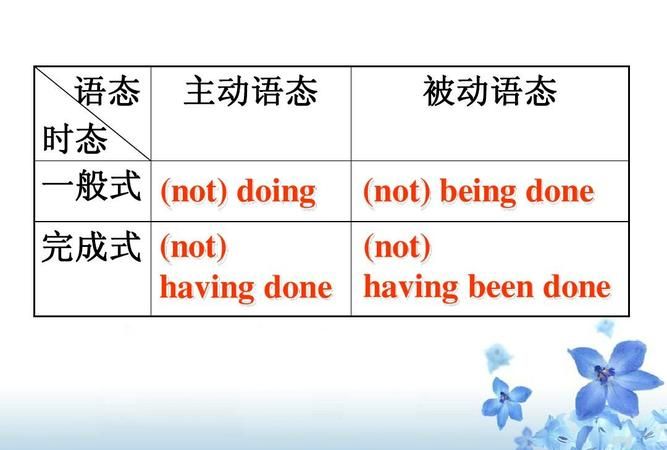本文目录
doing和done作定语
done:
1、The work finished yesterday has been handed in
2、I am interested in drawing
3、I have my hair cut
doing:
1、The man standing there is someone I know
2、The story is interesting
3、 I saw him walking into the forest
你分清楚1、2、3哪句是定、表、补了吗?

宾语补足语的题目
宾语补足语有以下几类。
1.由动词不定式充当。多数是带to的不定式,也有不带to的不定式。
1).要求带to的不定式作宾语补足语的动词有tell,ask,invite,force,get,beg,allow,wish,want,like,prefer,intend,expect,encourage,advise,permit,order,warn,cause等。
eg.
I would prefer you not to change your plan.
我宁愿你不要改变计划。
They encouraged me to try again.他们鼓励我再次尝试。
2).某些动词如think,consider,believe,know,find等后面作宾语补足语的不定式常用to be + adj.的结构。
eg.
We believed him to be stupid.我们认为他很笨。
He didn”t consider himself (to be) important.
他并不认为自己重要。
3).某些动词如make,have,let,see,hear,watch,notice,feel等后作宾语补足语的不定式不带to。
eg.
He made us stay for tea.他使我们留下来吃茶点。
Let me introduce you to Miss Li.让我介绍你和李小姐认识。
Did you notice me leave/leaving the house
你注意到我离开了(正在离开)那房子吗?
4).变为被动语态时,不定式符号to必须保留。
eg.
People who won”t work should be made to work.
必须要不愿工作的人工作。
The middle-aged man was seen to enter the building.
人们看见那中年男子走进大楼。
2.由-ing形式或过去分词充当。
1).当宾语补足语的动作由作宾语的名词或代词发出时,宾语补足语用-ing形式。
eg.
He could hear his heart beating fast.
他可以听见自己的心脏跳得很快。
Do you smell something buring? 你闻到烧焦的气味了吗?
2).当宾语是宾语补足语发出的动作对象时,宾语补足语用过去分词形式。
eg.
You'd better have the desk painted.你最好请人把课桌漆一下。
I've never heard the song sung.我从未听见那首歌被人唱过。
3.由名词充当。
某些动词call, name, make, elect, think, find, consider, appoint后接名词或代词作其语,再接名词作宾语补足语,补充说明宾语的身份。
eg.
He made her secretary.他挑选她当秘书。
Her parents died, leaving her an orphan.
她父母双亡,使她成了孤儿。
They considered Paris the brain and heart of the country.
他们把巴黎看作国家的大脑和心脏。
4.由形容词充当。
某些动词如make,paint,keep,find,like,want等后接名词或代词作宾语,再接形容词作宾语补足语,补充说明宾语的状态、特征等。有的已构成固定词组。
eg.
Do you like your tea weak or strong?
你喜欢把茶泡浓一点还是淡一点?
You must keep the classroom clean.你应保持教室清洁。
The boy was beaten black and blue.男孩被打得青一块紫一块。
5. 由介词短语充当
eg.
I found everything in good condition.
我发现一切情况都很好。
这样可以么?

to do做宾语补足语的例句
ing与to
do做宾补
现在分词通常在下列动词后作宾语补足语:see
,
hear
,
notice
,
watch
,
keep
,
find
,
get
,
have
,
feel
e.g.
·he
heard
someone
knocking
at
the
door
.
·i”m
sorry
to
have
kept
you
waiting
.
在see
,
hear
,
watch
,
notice
等动词后不定式作宾语补足语与现在分词作宾语补足语的区别:
现在分词作宾语补足语表示动作正在进行;不定式作宾补表示动作从开始到结束的全过程。
e.g.·as
i
drove
past
the
park
,
i
saw
some
people
playing
football
.
(=
when
i
saw
them
,
they
were
in
the
middle
of
playing
.)
·last
week
,
i
went
to
london
and
saw
england
play
brazil
in
the
big
football
match
.
(=
i
saw
the
whole
game
.)
·i
heard
someone
coming
up
the
stairs
.

have sb do和have sb doing区别
①have sb./sth.do sth.与have sb./sth.doing sth.两者都是宾语发出的主动动作。前者指 “使某人/物做某事(指一次性的具体的动作)”;后者指“使某人/物一直处于某种状态”,常接一段时间作状语。②have sth.done这一结构中的宾语与宾补动词是被动关系。③have sth. to do这一结构中的have意为“有”,即“有某事要做”。解题时要注意这四个结构的形式变化,如对宾语提问、被动结构等。
希望可以帮助你!满意的话,希望采纳,谢谢!

以上就是关于doing和done作宾补 ,doing和done作定语的全部内容,以及doing和done作宾补 的相关内容,希望能够帮到您。

